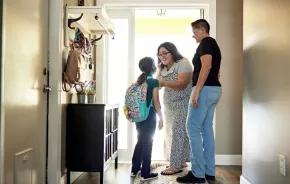
Editor's note: The author, Laura Kastner, Ph.D., will share how to set clear boundaries while maintaining a playful relationship with your kids and fostering family connection at a ParentMap lecture on March 31, 2015, from 7–9 p.m.
NEWS FLASH! Twenty years of research has established that emotional intelligence—social and emotional skills — truly does foster success in kids. Parents should be craving this stuff for their kids more than perfect SAT’s and Olympic level athletic skills!
Why aren’t parents buzzing about this? Why is there still more obsession with grades, AP class enrollment and talent development than sharing intimate and positive moments in the family? Is emotional intelligence just “too mushy” a concept, since you can’t measure it as easily? Perhaps — but I think the big rub is that it is best developed in the home.
What is the parenting package that helps to develop this vital essence?
I have created an acronym (RELATE) to identify the emotional and social skills we want to model and encourage in the home. These skills predict higher achievement, better emotional adjustment and more successful relationships in your child’s future.
R Remain calm so that you can interact with loved ones in respectful ways.
E Express emotions appropriate to the situation and the child’s age.
L Label emotions, giving your children a broad vocabulary for expressing their own.
A Acknowledge the cause of your emotions, without blaming, just describing.
T Take responsibility for managing your negative emotions, especially while in conflict.
E Empathize with your child’s feelings genuinely.
Remember that empathy does not imply agreement or giving into a child’s rage, protest or demands. Capable and authoritative parents are compassionate, but they don’t spoil their kids. They appreciate that children can be wildly intense, disappointed, anxious, angry and irritable, but they don’t react to these emotions. They hold the line on behavioral expectations, but accept that children have messy feelings.
Kids can be quite disrespectful when they experience their messy and negative feelings. Even tweens and teens can’t regulate their emotions consistently due to the immaturity of the prefrontal cortex (the “thinking” and “impulse control” center of the brain). Neurobiological maturation is a long term project that takes over twenty years. As the parent, you are the one who is supposed to have self management skills up and running, not them.
What is “good enough” parenting and why is it harder to achieve these days?
Let me reassure you that when psychologists implore families to think more consciously about how they are interacting with their children at home, we are only aiming for good enough. Still, it can be a monumental task to slow down in our modern lives so that we can behave in thoughtful, authoritative and loving ways which support secure attachment. The key is balancing discipline, wholesome fun and attuned, responsive interchanges (henceforth here, called “good enough” parenting). As children morph into tweens and teens, living these values and deciding priorities becomes increasingly complex.
By the time your kids are tweens (ages 8-12), good enough parenting represents a decade of skillful, executive decision-making and a heck of lot of self-discipline. What does it look like in normal life? First and foremost, it requires turning off electronics (yours and theirs) and being home so that you can have relational time — listening, laughing, admiring, playing, appreciating, and sharing thoughts, feelings and experiences. If this kind of quality time doesn’t involve a lot of money and gadgetry, and is either activity-oriented (bikes, walks, or games anyone?) or conversational face time, good for you. We develop empathy through looking at one another and activating mirror neurons with kindly moments together.
We need to read to our children as much as possible. Parents of young children fret too much about creating early readers and focus too little on oral reading, going the library and enjoying fabulous books together. Reading together is so nurturing, free and simple, and so immensely important to educational success, we must ask ourselves why it is often a lost art in family life. It has a simple and complicated answer: it represents a parental commitment of time — and lots of it. Time is a finite resource and most of us feel like we don’t have enough of it.
Before you write me off as a Luddite, let’s get back to the endgame here.
Parental love, college preparation and a transition to adulthood
Most parents agree on what we want for our children. For starters, we want them to be successful, independent and well-adjusted. By the teen years, achieving these goals means that your child makes the academic grades which result in college admission, is capable in relationships, copes with stress in adaptive ways and feels secure about launching from the home.
Parents also want their children to be healthy, happy and wise. By the teen years, optimal health certainly includes a certain amount of athletic, social and extracurricular activities. It also means (ideally) not abusing drugs, not becoming depressed or anxiety disordered and not making stupid mistakes that get them thrown out of school or into the slammer. Notice the “not’s”? By the time you’re parenting teens, you know how critical mental and physical health is to everything else.
What parents seem not to realize is how much these goals rely on relationships in the home and their own social and emotional functioning during the first decade of life. You can “get away” with over-busy, electronic-laden and entertainment-filled years, but it is dreadfully hard to pull the plug on tweens and teens and start learning RELATE skills in the second decade without a firm grounding in the first.
I admit that face time and dinners with kids are often boring, filled with fracas and packed with emotional button-pushing. No wonder we turn to email, TV, “look good” child activities, and work, and let them have access to on-line everything — all in our own private spaces. It’s easier! Way easier. But then, what about the big chunks of time we need for investing in RELATE skills so that kids can develop emotional and social competence? And of course, only by committing to family time do we encounter those magical moments of loving bliss.
Lest you think that those in need of this emotional intelligence agenda are “those other high-risk” families (you know — the ones suffering from poverty, abuse and other social ills), think again. Compared to less-privileged families, research has documented that affluent teens have higher levels of depression, anxiety, and drug abuse, which is associated with academic pressure and disconnection from parents. If that isn’t an endorsement for enhancing the quality of family time and watching your word count related to haranguing about school, grades and tests, I don’t know what is.
The winners in the end will be those children with parents who RELATE to them
Summarizing this important information is the easy part of public health promotion. What psychologists like me muse about to no end is how so many well-intentioned, loving parents stray off the mark in achieving “good enough” parenting because they haven’t prioritized family connection.
Exclusively pursuing high grades, premier athletics and talent development just seems so much more enriching for child development than making time for some hanging out at home. And we’ve become so accustomed to being distracted and over-wired, we don’t know how harmful it is to emotional and social learning. Affiliating with family and friends—faces turned toward one another and smiling, responding and even quarreling—has become a profoundly endangered resource, even though we evolved doing just this in our social circles for millions of years.
Parental modeling of emotional and social skills sounds simple, but today it represents a hot commodity. It’s harder than it sounds. It requires canceling some lessons, night meetings, and HBO. It means banning online access for everyone during your “special time.” Who would ever have imagined when we were kids that “the next big thing” would not be a technological breakthrough but instead a family sanctuary?











